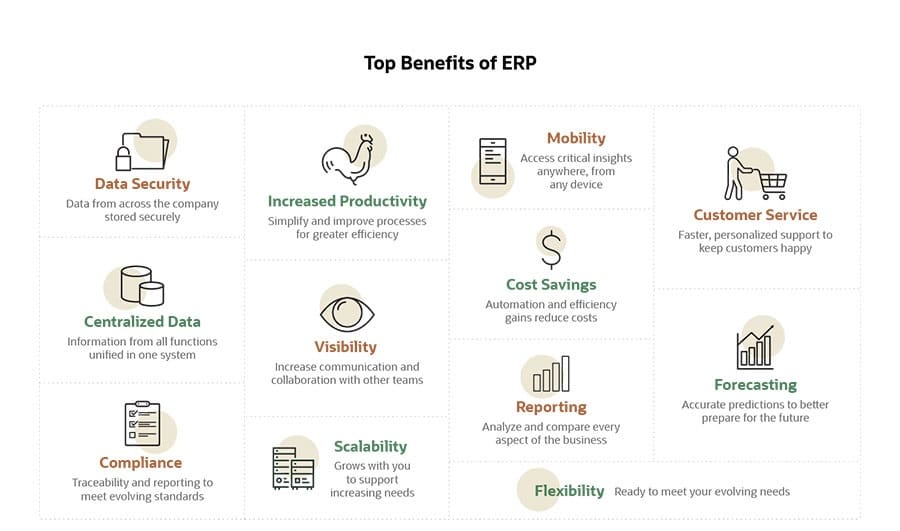Managing a growing business requires seamless integration of financials, inventory, operations, and customer management. Traditional systems often create data silos and inefficiencies, making it difficult for businesses to scale effectively.

Oracle NetSuite ERP is a cloud-based enterprise resource planning (ERP) software that centralizes business operations into a single platform, enabling companies to:
- Automate financial and accounting tasks
- Optimize inventory and supply chain management
- Improve customer relationship management (CRM)
- Gain real-time insights for better decision-making
This guide covers how NetSuite works, its key features, pricing, and why it’s one of the leading ERP solutions for businesses of all sizes.
What is NetSuite ERP?
NetSuite ERP is a comprehensive cloud-based enterprise resource planning (ERP) software developed by Oracle. It provides an integrated solution for managing:
- Financials & Accounting
- Inventory & Supply Chain
- Order Management
- Customer Relationship Management (CRM)
- Human Resources & Payroll
- E-Commerce & Retail
Unlike traditional on-premise ERP systems, NetSuite is fully cloud-based, allowing businesses to access real-time data from anywhere.
Key Benefits of NetSuite ERP
✔ Real-time data visibility across all business operations
✔ Automation of manual processes to increase efficiency
✔ Seamless integration with third-party applications
✔ Scalable for businesses of all sizes
✔ Multi-currency and multi-location support for global operations
NetSuite ERP is trusted by over 32,000 businesses worldwide, ranging from small enterprises to multinational corporations.
Key Features of NetSuite ERP
1. Financial Management & Accounting
- Automated billing, revenue recognition, and tax compliance
- Multi-currency and multi-subsidiary financial reporting
- Bank reconciliation and expense management
2. Inventory & Supply Chain Management
- Real-time inventory tracking across multiple locations
- Warehouse and order fulfillment automation
- Demand forecasting and procurement planning
3. Customer Relationship Management (CRM)
- 360-degree customer view with sales, support, and communication history
- Automated sales pipeline tracking and forecasting
- Lead nurturing and customer engagement tools
4. E-Commerce & Retail Integration
- Unified platform for online and in-store sales
- Multi-channel order management
- Automated tax and pricing calculations
5. Human Capital Management (HCM) & Payroll
- Employee self-service portals
- Payroll automation with compliance tracking
- Talent management and workforce analytics
6. Business Intelligence & Reporting
- Custom dashboards and reports for real-time insights
- AI-driven forecasting and analytics
- Advanced financial and operational metrics tracking
NetSuite ERP Pricing – How Much Does It Cost?
NetSuite pricing is customized based on business size, number of users, and required modules. While Oracle does not publicly disclose pricing, estimated costs include:
| Plan | Best For | Estimated Pricing |
|---|---|---|
| NetSuite Starter Edition | Small businesses & startups | Starts at $999/month + per-user fees |
| NetSuite Standard Edition | Mid-sized businesses with moderate operations | Custom pricing |
| NetSuite Enterprise Edition | Large enterprises with complex needs | Custom pricing |
To get accurate pricing, businesses need to request a custom quote based on their specific needs.
Request a NetSuite Pricing Quote
Who Should Use NetSuite ERP?
NetSuite is ideal for businesses that:
✔ Need a scalable ERP solution with cloud-based access
✔ Operate across multiple locations, currencies, and subsidiaries
✔ Want to automate finance, supply chain, and sales processes
✔ Require real-time analytics and reporting
Industries That Benefit Most from NetSuite
| Industry | Key Benefits |
|---|---|
| Retail & E-Commerce | Unified inventory and order management |
| Wholesale Distribution | Real-time supply chain tracking and automation |
| Manufacturing | Production planning, BOM tracking, and warehouse management |
| Professional Services | Project-based accounting, time tracking, and client management |
| Software & SaaS | Subscription billing, revenue recognition, and customer support tools |
NetSuite ERP vs. Other ERP Solutions
| ERP System | Best For | Pricing |
|---|---|---|
| NetSuite ERP | All-in-one cloud ERP for mid-sized to large businesses | Starts at $999/month |
| SAP Business One | Manufacturing & large enterprises | Custom pricing |
| Microsoft Dynamics 365 | Businesses using Microsoft ecosystem | Starts at $180/user/month |
| Odoo ERP | Open-source and budget-friendly ERP | Free – $25/user/month |
| QuickBooks Enterprise | Small business accounting | Starts at $140/month |
NetSuite offers a fully cloud-based, scalable ERP, while SAP, Microsoft Dynamics, and QuickBooks cater to specific business needs.
How to Implement NetSuite ERP Successfully
1. Assess Business Needs & ERP Goals
- Identify pain points and inefficiencies
- Define required modules (finance, CRM, inventory, HR, etc.)
2. Choose the Right NetSuite Edition & Modules
- Starter Edition for small businesses
- Standard Edition for mid-sized businesses
- Enterprise Edition for large corporations
3. Work with a NetSuite Implementation Partner
- Implementation requires expertise in configuration, customization, and integration
- Certified NetSuite partners can provide training and ongoing support
4. Optimize and Automate Business Processes
- Configure workflows to reduce manual tasks
- Integrate NetSuite with existing software for seamless data sharing
Frequently Asked Questions (FAQ) About NetSuite ERP
1. Is NetSuite suitable for small businesses?
Yes, NetSuite offers a Starter Edition for small businesses, but pricing is higher than alternatives like QuickBooks or Odoo.
2. Does NetSuite integrate with other business applications?
Yes, NetSuite integrates with Salesforce, Shopify, PayPal, QuickBooks, and other third-party software.
3. How is NetSuite different from QuickBooks?
NetSuite is a full ERP system that includes financials, CRM, supply chain, and e-commerce, while QuickBooks primarily focuses on accounting.
4. What is the difference between NetSuite and SAP?
NetSuite is fully cloud-based, whereas SAP offers both cloud and on-premise solutions. SAP is preferred by large enterprises, while NetSuite is more flexible for mid-sized businesses.
Conclusion – Is NetSuite the Right ERP for Your Business?
NetSuite is a powerful, scalable ERP solution that enables businesses to:
- Automate finance, inventory, CRM, and HR processes
- Gain real-time insights into business performance
- Scale operations without infrastructure limitations
For companies looking for a comprehensive cloud-based ERP, NetSuite is one of the best choices in 2025.